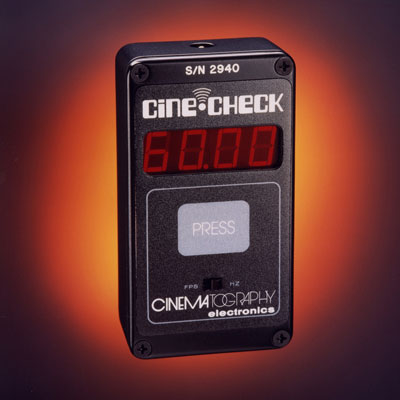|
The Cinematography Electronics CINE-CHECK is a small hand held optical tachometer
designed specifically for the motion picture industry. The CINE-CHECK identifies
inaccurate frequencies of AC power sources that produce flicker on film when using HMI
lights or fluorescent lights. The CINE-CHECK is also an effective tool for measuring the
scan rates of computer and video monitors. When the filming speed of the camera is set
to the measured scan rate of the monitor, the monitor can be filmed without an
irritating roll bar. In addition, the CINE-CHECK measures the speed of motion picture
cameras. The compact design, crystal accuracy, bright numeric LED display and ease of
use have made the CINE-CHECK a standard accessory for directors of photography,
assistant cameramen and gaffers.
|
 |
|
Cine-Check
The CINE-CHECK’s optical sensor detects pulses in the light source, computes the frequency in either
frames per second (fps) or Hertz (Hz), and indicates that frequency on the bright numeric LED
display. The optical sensor is activated by pointing the CINE-CHECK toward an AC light source and
pressing the On/Off membrane switch. While holding the On/Off switch for a few seconds, the measured
frequency is displayed. The displayed units are in fps or Hz (from 1.00 to 99.99), and are
determined by the position of the mode switch. These features make the CINE-CHECK the ideal
diagnostic tool for measuring the frequency of AC power sources, the scan rate of computer and video
monitors, or the speed of motion picture cameras.
Flicker on film is a common problem caused by the rhythmic changing of the light level within the
scene. This changing light level is the result of exceptionally small inaccuracies in the frequency
of the AC power source or camera speed. The CINE-CHECK is an excellent tool for identifying
inaccurate frequencies of the AC power, and allows the user to make necessary adjustments before
filming. It only takes a few seconds to measure the frequency of the AC power with the CINE-CHECK.
By setting the mode switch to the Hz position and pointing the optical sensor towards the area lit
with HMI lights or fluorescent lights, the displayed reading is the frequency of the AC power
source.
The CINE-CHECK is capable of measuring the speed of any motion picture camera. A constant light
source, such as a flashlight or sunlight, must be directed into the lens or lens port of the camera.
By switching the camera on, a light to dark transition is generated by the shutter on the ground
glass. With the mode switch set to the fps position and the CINE-CHECK aimed into the eyepiece, the
camera speed is quickly measured in frames per second, accurate to 0.01 fps. Unlike patterned
LED-oriented speed checkers, the CINE-CHECK displays the camera speed measurements in easy-to-read
numerals.
When filming computer or video monitors, it is very important to film at the proper speed. Otherwise,
an irritating roll bar will appear on film. To select the proper filming speed, the scan rate of the
monitor must be determined. By using the CINE-CHECK, the scan rate is established in just a few
seconds. With the mode switch in the Hz position and the optical sensor aimed at a bright area on
the screen, the measured reading is the filming speed when using a 180 camera shutter.
The CINE-CHECK is powered by a 9 volt alkaline battery and indicates a low battery voltage by
illumination of all four decimal points on the LED display. A protective leatherette carrying pouch
with belt loop is included.
Specifications:
|
CINE-CHECK |
|
| Size: |
Inch: 2.4 x 4.4 x 1.2 mm: 60 x 110 x 32 |
| Weight: |
8 oz (240 Grams) |
| Construction: |
Rugged Die Cast Aluminum |
| Finish: |
Satin Black Paint over Black Anodize |
| Modes of Operation: |
fps or Hz |
| Frequency Range: |
1.00 to 99.99 fps |
| |
1.00 to 99.99 Hz |
| Accuracy: |
0.01 fps |
| |
0.01 Hz |
| Sampling Time: |
1 Second, Crystal Controlled |
| Mode Switch: |
Slide |
| On/Off Switch: |
Flush-Mounted Membrane |
| Numeric Display: |
Bright Red LED (inch: 0.56 mm: 14) |
| Special Feature: |
Automatic Battery Test |
| Battery: |
9 Volt Alkaline |
|
|
